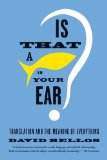Summary | Excerpt | Reviews | Beyond the Book | Readalikes | Genres & Themes | Author Bio

Critics' Opinion:
Readers' Opinion:
First Published:
Oct 2011, 384 pages
Paperback:
Oct 2012, 384 pages
 Book Reviewed by:
Book Reviewed by:
Elizabeth Whitmore Funk
Buy This Book
ONE
What Is a Translation?
Douglas Hofstadter took a great liking to this short poem by the sixteenth-century French wit Clément Marot:
Ma mignonne,
Je vous donne
Le bon jour;
Le séjour
C'est prison.
Guérison
Recouvrez,
Puis ouvrez
Votre porte
Et qu'on sorte
Vitement,
Car Clément
Le vous mande.
Va, friande
De ta bouche,
Qui se couche
En danger
Pour manger
Confitures;
Si tu dures
Trop malade,
Couleur fade
Tu prendras,
Et perdras
L'embonpoint.
Dieu te doint
Santé bonne,
Ma mignonne.
He sent a copy of it to a great number of his friends and acquaintances and asked them to translate it into English, respecting as well as they could the formal properties that he identified in it:
(1) 28 lines
(2) of 3 syllables each
(3) in rhyming couplets
(4) with the last line being the same as the first;
(5) midway the poem changes from formal (vous) to informal (tu) and (6) the poet puts his own name directly into the poem.
Hofstadter, a cognitive scientist at Indiana University, got many dozens of responses over the following months and years. Each one of them was different, yet each one of them was without doubt a translation of Marot's little poem. By this simple device he demonstrated one of the most awkward and wonderful truths about translation. It is this: any utterance of more than trivial length has no one translation; all utterances have innumerably many acceptable translations.
You get the same result with ordinary prose as you do with a poem. Give a hundred competent translators a page to translate, and the chances of any two versions being identical are close to zero. This fact about interlingual communication has persuaded many people that translation is not an interesting topic - because it is always approximate, it is just a second-rate kind of thing. That's why "translation" isn't the name of a long-established academic discipline, even though its practitioners have often been academics in some other field. How can you have theories and principles about a process that comes up with no determinate results?
Like Hofstadter, I take the opposite view. The variability of translations is incontrovertible evidence of the limitless flexibility of human minds. There can hardly be a more interesting subject than that.
What is it that translators really do? How many different kinds of translating are there? What do the uses of this mysterious ability tell us about human societies, past and present? How do the facts of translation relate to language use in general - and to what we think a language is?
Those are the kinds of questions I explore in this book. Definitions, theories, and principles can be left aside until we have a better idea of what we are talking about. We shouldn't use them prematurely to decide whether the following version of Clément Marot's poem (one of many by Hofstadter himself) is good, bad, or indifferent. It's the other way around. Until we can explain why the following version counts as a translation, we don't really know what we're saying when we utter the word.
Gentle gem,
Diadem, Ciao!
Bonjour!
Heard that you're
In the rough:
Glum, sub-snuff.
Precious, tone
Down your moan,
And fling wide
Your door; glide
From your oy-
ster bed, coy
Little pearl.
See, blue girl,
Beet-red ru-
by's your hue.
For your aches,
Carat cakes
Are the cure.
Eat no few'r
Than fourteen,
Silv'ry queen -
But no more
'n twenty-four,
Golden dream.
How you'll gleam!
Trust old Clem
Excerpted from Is That a Fish in Your Ear? by David Bellos. Copyright © 2011 by David Bellos. Excerpted by permission of Faber and Faber. All rights reserved. No part of this excerpt may be reproduced or reprinted without permission in writing from the publisher.





The Funeral Cryer by Wenyan Lu
Debut novelist Wenyan Lu brings us this witty yet profound story about one woman's midlife reawakening in contemporary rural China.
Your guide toexceptional books
BookBrowse seeks out and recommends the best in contemporary fiction and nonfiction—books that not only engage and entertain but also deepen our understanding of ourselves and the world around us.